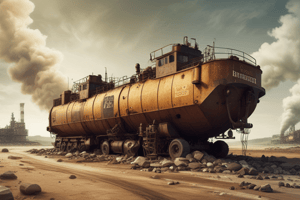Podcast
Questions and Answers
You are on site and you need to dispose of some waste liquid which has oil in it and you are not sure what to do with it. What should you do?
You are on site and you need to dispose of some waste liquid which has oil in it and you are not sure what to do with it. What should you do?
- Pour it onto the ground, it will soak away
- Dispose of it in a sealed container into the site skip
- Take it outside and set light to it
- Ask your supervisor about the correct way to deal with this waste. (correct)
How should you get rid of hazardous/special waste?
How should you get rid of hazardous/special waste?
- Take it home, they wont want it on site
- In accordance with the correct site waste rules (correct)
- Put it at the bottom of any site skip
- Take it to the nearest local authority waste tip
Which of the following is classed as hazardous/special waste?
Which of the following is classed as hazardous/special waste?
- Non-asbestos Insulation
- Empty cement bags
- Fluorescent light tubes (correct)
- Polythene and shrink wrap
Which of the following should be disposed of as hazardous/special waste?
Which of the following should be disposed of as hazardous/special waste?
You need to clean up some oil that has leaked from machinery onto the ground. What is the right way to do this?
You need to clean up some oil that has leaked from machinery onto the ground. What is the right way to do this?
Other site workers are complaining that you are generating too much dust. What should you do?
Other site workers are complaining that you are generating too much dust. What should you do?
Who needs to understand relevant environmental risks on a construction site?
Who needs to understand relevant environmental risks on a construction site?
Under environmental law, which statement is true?
Under environmental law, which statement is true?
Do individuals have any responsibility for sustainability when on site?
Do individuals have any responsibility for sustainability when on site?
Which of the following is NOT best practice from a sustainability point of view?
Which of the following is NOT best practice from a sustainability point of view?
Which of the following does NOT help sustainability during construction projects?
Which of the following does NOT help sustainability during construction projects?
Which of the following should you do on site in the interest of sustainability?
Which of the following should you do on site in the interest of sustainability?
Which of the following is NOT part of environmentally-friendly construction?
Which of the following is NOT part of environmentally-friendly construction?
From an environmental point of view, why should materials be reused, where possible?
From an environmental point of view, why should materials be reused, where possible?
Which action will help to minimise waste?
Which action will help to minimise waste?
Which of the following is good environmental practice?
Which of the following is good environmental practice?
Do individuals have any responsibility for minimising the amount of waste created on site?
Do individuals have any responsibility for minimising the amount of waste created on site?
If you have unused material left, what should you do before you consider putting non-hazardous waste items into a skip?
If you have unused material left, what should you do before you consider putting non-hazardous waste items into a skip?
Why should different types of waste be separated on site?
Why should different types of waste be separated on site?
When storing liquids (such as oils, fuels or chemicals) on-site, what must you do?
When storing liquids (such as oils, fuels or chemicals) on-site, what must you do?
What can help to prevent harm to the environment from oil spillages?
What can help to prevent harm to the environment from oil spillages?
Flashcards
What are the rules for disposing of hazardous waste?
What are the rules for disposing of hazardous waste?
Hazardous or special waste needs proper handling, segregation, and disposal through officially approved methods.
What is an example of hazardous waste?
What is an example of hazardous waste?
Fluorescent light tubes contain mercury, which is a hazardous substance.
What type of waste needs to be disposed of as hazardous?
What type of waste needs to be disposed of as hazardous?
Aerosol sealants can explode if not handled and disposed of properly.
How should you dispose of oil-contaminated soil?
How should you dispose of oil-contaminated soil?
Signup and view all the flashcards
What should you do if you're creating too much dust?
What should you do if you're creating too much dust?
Signup and view all the flashcards
Who is responsible for environmental safety on a construction site?
Who is responsible for environmental safety on a construction site?
Signup and view all the flashcards
Can individuals get into trouble for breaking environmental laws?
Can individuals get into trouble for breaking environmental laws?
Signup and view all the flashcards
Do individuals have a role in sustainability on construction sites?
Do individuals have a role in sustainability on construction sites?
Signup and view all the flashcards
What is NOT a good sustainability practice?
What is NOT a good sustainability practice?
Signup and view all the flashcards
What action is harmful to sustainability on a construction site?
What action is harmful to sustainability on a construction site?
Signup and view all the flashcards
What is the best practice for sustainability on a construction site?
What is the best practice for sustainability on a construction site?
Signup and view all the flashcards
What is NOT part of environmentally-friendly construction?
What is NOT part of environmentally-friendly construction?
Signup and view all the flashcards
Why is reusing materials environmentally beneficial?
Why is reusing materials environmentally beneficial?
Signup and view all the flashcards
What action helps minimize waste on a construction site?
What action helps minimize waste on a construction site?
Signup and view all the flashcards
Why is segregating waste important for the environment?
Why is segregating waste important for the environment?
Signup and view all the flashcards
Is minimizing waste a responsibility for everyone on site?
Is minimizing waste a responsibility for everyone on site?
Signup and view all the flashcards
What should you do with unused materials before placing them in a skip?
What should you do with unused materials before placing them in a skip?
Signup and view all the flashcards
Why is it important to separate different types of waste?
Why is it important to separate different types of waste?
Signup and view all the flashcards
How should liquids like oil, fuel, and chemicals be stored on site?
How should liquids like oil, fuel, and chemicals be stored on site?
Signup and view all the flashcards
What can help prevent environmental damage from oil spills?
What can help prevent environmental damage from oil spills?
Signup and view all the flashcards
How does working safely on site relate to sustainability?
How does working safely on site relate to sustainability?
Signup and view all the flashcards
What are some environmental impacts of construction projects?
What are some environmental impacts of construction projects?
Signup and view all the flashcards
What makes a construction project sustainable?
What makes a construction project sustainable?
Signup and view all the flashcards
What is the importance of environmental consideration in every stage of a construction project?
What is the importance of environmental consideration in every stage of a construction project?
Signup and view all the flashcards
How can construction projects be made more environmentally friendly?
How can construction projects be made more environmentally friendly?
Signup and view all the flashcards
How can the construction industry contribute to a sustainable future?
How can the construction industry contribute to a sustainable future?
Signup and view all the flashcards
Study Notes
Hazardous Waste Disposal
- Hazardous/special waste requires proper storage and segregation before removal by a licensed waste carrier.
- Oil spillage and burning waste on-site are offences under environmental law.
- Hazardous waste must be handled according to site rules or by local authorities
- Oil-contaminated waste is classified as hazardous/special waste
- Hazardous waste must be properly segregated, treated, and recovered or disposed of in an approved way according to legislation
- Fluorescent light tubes are considered hazardous waste due to their mercury content.
- Aerosol sealants are hazardous because they can explode if not handled correctly or disposed of improperly, and may contain hazardous solvents.
Waste Disposal Procedures
- Ask a supervisor for the correct way to dispose of oily waste liquids.
- Dispose of oily contaminated soil in a suitable container for hazardous waste.
- Wash away oil spills with water and detergent, if permissible.
- Use appropriate containers for hazardous waste, following site rules and local waste regulations.
Dust Management
- If site workers complain about excessive dust, inform your supervisor.
- Excessive dust can be a nuisance and may cause health hazards.
- Provide dust masks to workers if dust levels are excessive.
Environmental Risks and Responsibilities
- All site workers have responsibility for environmental protection and sustainability.
- Follow company rules for waste segregation and disposal
- Everyone on site should understand environmental risks
- Minimise waste creation and use materials and resources efficiently
- Segregate waste materials, and treat them appropriately before disposal
- Avoid leaving engines or motors running unnecessarily
Sustainable Construction Practices
- Comply with site instructions for handling waste materials.
- Do not bury waste materials or pour liquids down drains off-site
- Reuse materials whenever possible: re-using materials uses less energy and raw materials than creating new ones.
- Reduce the production of waste as the preferred option.
- Segregate waste into different types for easier recycling or disposal.
- Keep skips covered to prevent the build-up of pressures or further environmental hazards
Studying That Suits You
Use AI to generate personalized quizzes and flashcards to suit your learning preferences.




